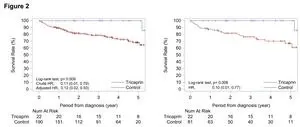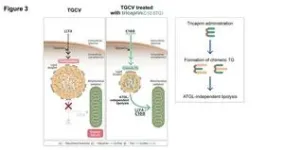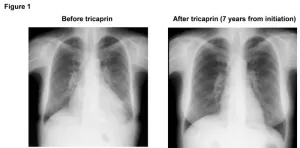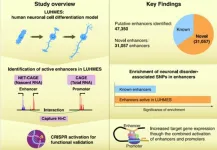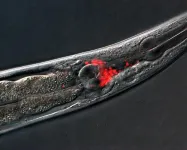(Press-News.org) Pesticides are causing overwhelming negative effects on hundreds of species of microbes, fungi, plants, insects, fish, birds and mammals that they are not intended to harm – and globally their use is a major contributor to the biodiversity crisis.
That is the finding of the first study assessing the impacts of pesticides across all types of species in land and water habitats, carried out by an international research team that included the UK Centre for Ecology & Hydrology (UKCEH) and the University of Sussex.
Multiple negative impacts
The scientists analysed over 1,700 existing lab and field studies of the impacts of 471 different pesticide types – either insecticides, fungicides or herbicides – in agricultural, commercial or domestic use.
Wide-ranging negative effects were seen for over 800 species found on land and in water, including impacts on how fast they grow, their reproductive success, and even behaviour such as their ability to catch prey, find plants to forage upon, move, or attract mates. Pesticides can also affect organisms’ metabolism and damage cells.
These negative effects can result in the premature death of wild organisms and reduce populations.
The international study, led by East China University of Science and Technology, has been published in Nature Communications.
The researchers say that, unlike previous studies which have tended to look at specific groups of species such as bees, fish or plants, or specific habitats, they have considered representatives of the whole spectrum of species found in the natural world.
Necessary option
“Our study provides an unparalleled insight into the consequences of pesticide use on the natural environment globally,” said co-author Dr Ben Woodcock, an ecologist at UKCEH.
“Pesticides are a necessary evil, without which global food production and farmers’ livelihoods would likely collapse. However, our findings highlight the need for policies and practices to reduce their use. This could include bottom-up initiatives led by farmers such as regenerative agriculture, as well as government policies such as Defra’s Sustainable Farming Incentive, which pays farmers to reduce insecticide use on crops.”
Professor Dave Goulson of the University of Sussex, who was also part of the research, added: “It is often assumed that pesticides are toxic primarily to the target pest and closely related organisms, but this is clearly not true. Concerningly, we found pervasive negative impacts across plants, animals, fungi and microbes, threatening the integrity of ecosystems.”
Alternatives
Overuse of pesticides not only threatens beneficial species they are not intended to target but can also enable pests to develop resistance to the chemicals, rendering them ineffective. Farms in the UK, for example, are currently encouraged to carry out an Integrated Pest Management assessment which emphasises reduced pesticide use and natural pest control. In the European Union, over 10% of land under agricultural production is organic, using no synthetic pesticides.
Alternative options for farmers include planting wildflowers and beetle banks to support species that eat pests, allowing them to reduce spraying when there are high numbers of these natural predators present. Other measures include adjusting the timing of planting to avoid pests and rotating crops to break the species’ life cycles and reduce their numbers.
Gardeners can do their bit to reduce the use of chemicals. Options for natural pest control include introducing nematodes, ladybirds or mites, which can be bought online, and encouraging other natural predators such as frogs, birds and hedgehogs with wildlife-friendly gardening. Physical barriers such as netting can prevent caterpillar and bird damage.
Future developments
New monitoring work by UKCEH, working with Defra, is currently using honeybee colonies to monitor pesticide risks across England to act as an early warning of emerging problems.
Dr Woodcock pointed out there was a lot of scope in the future for developing agricultural methods to be more responsive to our natural pest controllers, such as AI monitoring of both pests and predators using high-tech cameras.
- Ends –
Media enquiries
For interviews and further information, please contact Simon Williams, Media Relations Officer at UKCEH, via simwil@ceh.ac.uk or +44 (0)7920 295384.
Notes to editors
Paper information
Wan et al. 2025. Pesticides have negative effects on non-target organisms. Nature Communications. DOI: 10.1038/s41467-025-56732-x. Open access.
About the UK Centre for Ecology & Hydrology (UKCEH)
The UK Centre for Ecology & Hydrology (UKCEH) is a leading independent research institute dedicated to understanding and transforming how we interact with the natural world.
With over 600 researchers, we tackle the urgent environmental challenges of our time, such as climate change and biodiversity loss. Our evidence-based insights empower governments, businesses, and communities to make informed decisions, shaping a future where both nature and people thrive.
www.ceh.ac.uk / X: @UK_CEH / LinkedIn: UK Centre for Ecology & Hydrology
About the University of Sussex
Over more than six decades the University of Sussex has developed a reputation for thinking differently, challenging convention and fostering critical thinking. Our research and teaching are curiosity-driven, addressing the most important issues of our time and finding solutions to environmental, scientific, social and technological challenges.
From scientific discovery to global policy, from student wellbeing to career development, Sussex innovates and takes a lead. Today, in every part of society and across the world, you will find someone from Sussex making an original and valuable contribution to positive social change.
www.sussex.ac.uk
END
Comprehensive global study shows pesticides are major contributor to biodiversity crisis
Analysis highlights negative impacts for over 800 species of non-target plants, animals, fungi and microbes
2025-02-13
ELSE PRESS RELEASES FROM THIS DATE:
A simple supplement improves survival in patients with a new type of heart disease
2025-02-13
Osaka, Japan – Heart transplant is a scary and serious surgery with high cost, but for patients with heart failure it can be the only option for cure. Now, however, a multi-institutional research team led by Osaka University has found that simply taking a supplement might be all that is needed for certain patients with heart failure to recover – no surgery needed.
In a study published in Nature Cardiovascular Research, the research team found that tricaprin, a natural supplement, can improve long-term survival and recovery from heart failure in patients with triglyceride deposit cardiomyovasculopathy ...
Uncovering novel transcriptional enhancers in neuronal development and neuropsychiatric disorders
2025-02-13
Neuropsychiatric disorders are becoming increasingly prevalent. Given their complex and multifactorial pathogenesis, there is an urgent need for effective and targeted therapies that can improve patients’ quality of life. Genome-wide association studies (GWASs) have identified various genetic alterations that contribute to the development and progression of neuropsychiatric disorders, ranging from mild dyslexia to more severe conditions such as schizophrenia.
While thousands of single nucleotide polymorphisms (SNPs)—changes in a single nucleotide position in the DNA—have been associated with neurological ...
IR Sant Pau study reveals immune system’s crucial role in ALS at cellular level
2025-02-13
A team of researchers from the Sant Pau Research Institute (IR Sant Pau) has published a study in the Journal of Neuroinflammation that, for the first time, examines in depth the role of the peripheral immune system in amyotrophic lateral sclerosis (ALS) at the single-cell level. Their findings suggest that immune system cells—particularly two subpopulations of Natural Killer (NK) cells—may play a crucial part in the development and progression of this neurodegenerative disease.
ALS is a condition that causes the progressive degeneration of motor neurones, leading to a loss of muscle function and, eventually, affecting ...
Brain rhythms can predict seizure risk of Alzheimer’s disease patients, study finds
2025-02-13
A UCLA Health research team has identified changes in brain rhythms that indicate seizure activity in Alzheimer’s patients.
The findings, published in Brain Communications, build on UCLA neurologist and senior author Dr. Keith Vossel’s pioneering work that first linked silent epileptic activity to cognitive decline in Alzheimer’s disease.
Vossel’s previous studies showed that silent seizures, detected through overnight electroencephalography (EEG) and one-hour magnetoencephalography (MEG), occur in more than 40% of Alzheimer’s patients—beyond the 20% who experience overt seizures. His research has demonstrated ...
Scientists develop innovative DNA hydrogels for sustained drug release
2025-02-13
Hydrogels are polymeric materials with three-dimensional network structures containing large amounts of water. They serve as sustained-release drug delivery systems as they can encapsulate various bioactive substances, including drugs, antigens, and even cells. Hydrogels are better drug delivery alternatives than conventional systems, as they are more biocompatible, biodegradable, and easily administered as an injectable scaffold.
DNA has gained significant attention as a promising hydrogel material thanks to its customizable physicochemical properties, leading to the development of various DNA ...
Paramedics facing challenging end-of-life care demands
2025-02-13
Paramedics in England are experiencing wide-ranging challenges in responding to the increasing number of end-of-life care patients they are being called out to, according to a study from the University of Southampton.
The study published in BMC Palliative Care highlights the issues paramedics face when responding to patients at end-of-life, including a lack of patient information, barriers to administering medication, and insufficient training.
It was funded by Marie Curie and supported by National Institute for Health and Care Research (NIHR) Applied ...
Worm study shows hyperactivated neurons cause aging-related behavioral decline
2025-02-13
A study of nematodes by researchers at Nagoya University in Japan has found that aging-related decline in brain function is caused by the excessive activation of certain neurons over time, rather than a decline in neuronal activity. This finding, published in the journal Proceedings of the National Academy of Sciences, suggests that interventions aimed at reducing neuronal hyperactivation, such as dietary changes, could potentially mitigate age-related cognitive decline.
Proper brain function occurs when a large number of neurons are connected to each other and work ...
Combining millions of years of evolution with tech wizardry: the cyborg cockroach
2025-02-13
Osaka, Japan – From disaster zones to extreme environments, there remain areas difficult for even humans to reliably access. This poses a problem for search-and-rescue operations, research, surveillance, and more. Now, however, a research team from Osaka University and Diponegoro University, Indonesia is hard at work on one potential solution: the cyborg insect.
Cyborg insects have a lot of advantages over traditional robots. Power consumption is less of an issue, so it’s easier to miniaturize them, and they are even ‘pre-built’ in a sense. However, research on cyborg insects has been limited to simple environments, like flat surfaces supplemented ...
Discrimination can arise from individual, random difference, study finds
2025-02-13
New research from the University of Sydney has found people tend to discriminate in favour of individuals who show a similarity to them, even when the similarity arises from a random event like the flip of a coin.
Published in Proceedings of the National Academy of Sciences, the research runs counter to traditional theories, in particular social identity theory, that assume discrimination occurs because we divide people into groups. It finds, instead, differences between individuals are enough to trigger discrimination.
Previous research (using the seminal ‘minimal group’ experiment) showed participants tend to financially benefit members of their own group over ...
Machine learning boosts accuracy of solar power forecasts
2025-02-13
As solar energy plays an increasing role in the global power supply, ensuring accurate forecasts of photovoltaic (PV) power generation is critical for balancing energy demand and supply. A new study published in Advances in Atmospheric Sciences explores how machine learning and statistical techniques can refine these forecasts by correcting errors in weather models.
Weather forecasts are a key input for PV power prediction models, yet they often contain systematic errors that impact accuracy. Researchers from the Institute of Statistics at the Karlsruhe Institute of Technology ...
LAST 30 PRESS RELEASES:
National Reactor Innovation Center opens Molten Salt Thermophysical Examination Capability at INL
International Progressive MS Alliance awards €6.9 million to three studies researching therapies to address common symptoms of progressive MS
Can your soil’s color predict its health?
Biochar nanomaterials could transform medicine, energy, and climate solutions
Turning waste into power: scientists convert discarded phone batteries and industrial lignin into high-performance sodium battery materials
PhD student maps mysterious upper atmosphere of Uranus for the first time
Idaho National Laboratory to accelerate nuclear energy deployment with NVIDIA AI through the Genesis Mission
Blood test could help guide treatment decisions in germ cell tumors
New ‘scimitar-crested’ Spinosaurus species discovered in the central Sahara
“Cyborg” pancreatic organoids can monitor the maturation of islet cells
Technique to extract concepts from AI models can help steer and monitor model outputs
Study clarifies the cancer genome in domestic cats
Crested Spinosaurus fossil was aquatic, but lived 1,000 kilometers from the Tethys Sea
MULTI-evolve: Rapid evolution of complex multi-mutant proteins
A new method to steer AI output uncovers vulnerabilities and potential improvements
Why some objects in space look like snowmen
Flickering glacial climate may have shaped early human evolution
First AHA/ACC acute pulmonary embolism guideline: prompt diagnosis and treatment are key
Could “cyborg” transplants replace pancreatic tissue damaged by diabetes?
Hearing a molecule’s solo performance
Justice after trauma? Race, red tape keep sexual assault victims from compensation
Columbia researchers awarded ARPA-H funding to speed diagnosis of lymphatic disorders
James R. Downing, MD, to step down as president and CEO of St. Jude Children’s Research Hospital in late 2026
A remote-controlled CAR-T for safer immunotherapy
UT College of Veterinary Medicine dean elected Fellow of the American Academy of Microbiology
AERA selects 34 exemplary scholars as 2026 Fellows
Similar kinases play distinct roles in the brain
New research takes first step toward advance warnings of space weather
Scientists unlock a massive new ‘color palette’ for biomedical research by synthesizing non-natural amino acids
Brain cells drive endurance gains after exercise
[Press-News.org] Comprehensive global study shows pesticides are major contributor to biodiversity crisisAnalysis highlights negative impacts for over 800 species of non-target plants, animals, fungi and microbes

